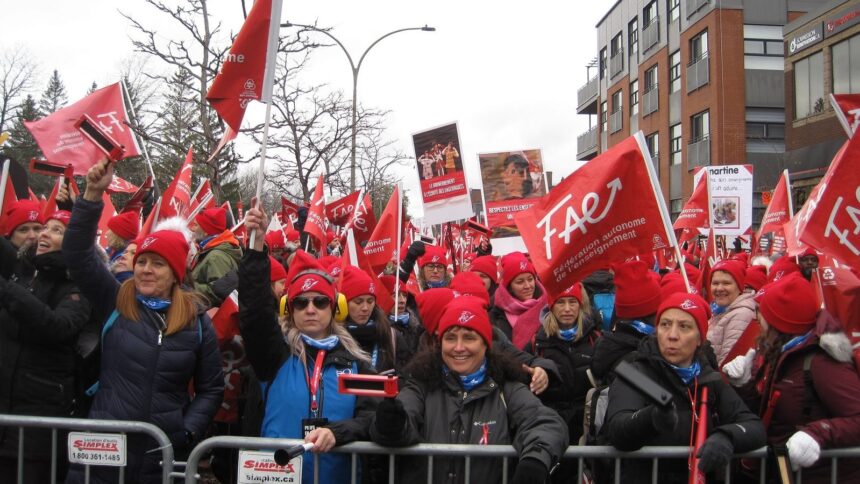As I stroll through the colorful corridors of École Secondaire Saint-Henri, the usual vibrant energy feels somewhat diminished. Teachers hurry between classes with extra stacks of papers under their arms, and the art room—normally a kaleidoscope of student creativity—sits locked on a Tuesday afternoon.
“C’est difficile cette année,” sighs Marianne Tremblay, who has taught French literature here for fifteen years. “We’re doing more with less, comme toujours, but this time it feels different.”
The difference Tremblay references stems from Quebec’s controversial education budget adjustments announced earlier this spring. The provincial government’s decision to reduce education funding by approximately $247 million has sent ripples across Montreal’s diverse educational landscape, affecting everything from arts programs to essential support services.
The Coalition Avenir Québec government defended these measures as necessary fiscal restraint amid economic pressures. Education Minister Bernard Drainville stated that schools must “find efficiencies without compromising educational quality,” a claim that has provoked considerable skepticism among educators.
At Saint-Henri, these “efficiencies” translate to three fewer teaching assistants, a reduced music program, and larger class sizes—up from an average of 26 students per class to nearly 32 in some instances.
“The math simply doesn’t work,” explains Robert Gendron, director of the Centre de services scolaire de Montréal. “When we reduce human resources while student needs increase, something has to give.”
What’s giving, according to parents and teachers across Montreal, are the supplementary programs and individualized attention that made Quebec’s education system distinctive. Arts programming, extracurricular activities, and specialized support for students with learning differences have all seen reductions.
The Montreal Teachers Association reports that approximately 420 teaching positions across the island will remain unfilled or eliminated due to budget constraints. This represents roughly 4% of the total teaching workforce in Montreal schools.
For families in neighborhoods like Côte-des-Neiges and Parc-Extension, where many newcomer students require additional language support, these cuts feel particularly harsh.
“My daughter used to receive extra French tutoring twice weekly,” says Maria Constanza, whose family moved from Peru three years ago. “Now it’s once a week in a group of eight students instead of four. I worry about her falling behind.”
The budget reductions arrive at a challenging moment. Quebec schools were still recovering from pandemic-related learning disruptions when financial constraints tightened. A recent study by Université de Montréal indicated that approximately 28% of Montreal students showed significant learning gaps in core subjects following COVID-19 interruptions—gaps that narrowed but didn’t close during the recovery period.
At Westmount High School, principal James Williams has resorted to creative solutions. “We’ve partnered with McGill education students who volunteer twice weekly. Local businesses have sponsored our STEM program. We’re surviving on community goodwill,” he tells me during a brief conversation between his many daily responsibilities.
The parents’ committees across Montreal’s school boards have mobilized in response. La Fédération des comités de parents du Québec organized three demonstrations since May, with the largest drawing approximately 12,000 participants to Place des Arts last month.
“These aren’t just numbers on a spreadsheet,” insists Catherine Harel, president of Montreal’s Alliance des Parents. “Each dollar removed represents an opportunity lost for our children. We’re talking about their futures.”
The financial impact varies significantly by neighborhood and school board. Schools in higher-income areas have parent foundations that can partially offset government cuts through fundraising. In Westmount and Outremont, parent associations raised between $60,000 and $120,000 last year to preserve enrichment programs.
This disparity troubles many education advocates. “We’re creating a two-tier system,” warns Professor Claude Lessard, education policy expert at Université de Montréal. “Schools in affluent areas can buffer these cuts through private fundraising. Those in working-class neighborhoods cannot.”
Perhaps most concerning are the cuts to psychological services and specialized education supports. Montreal’s public schools have seen a 15% reduction in hours allocated for psychologists, speech therapists, and special education consultants.
“We identify students who need help, but now face months-long waiting lists to provide that help,” explains Sophie Bergeron, a school psychologist serving three east-end elementary schools. “Five years ago, I worked with two schools. The needs haven’t decreased—only the resources have.”
For some families, the solution has been Quebec’s private education system, which already educates nearly 17% of the province’s students—the highest proportion in Canada. Applications to private institutions increased by 12% this year, according to the Fédération des établissements d’enseignement privés.
Back at Saint-Henri, I witness something both heartbreaking and inspiring. In the teacher’s lounge, educators pool personal funds to purchase classroom supplies. Tremblay contributes $50 toward a classroom set of novels. Another teacher offers to share his printer since the department’s was removed to save maintenance costs.
“On continue,” Tremblay says with determined resignation that seems to capture the spirit of Quebec’s educators. “These students didn’t create this situation, and they shouldn’t bear the consequences. So we adapt.”
As Montreal’s school year progresses under these constraints, the full impact remains to be seen. What’s already evident is that Quebec’s education system, long a source of provincial pride, finds itself at a crossroads where financial decisions today will shape educational outcomes for years to come.







